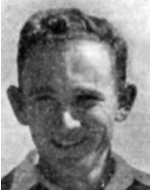Schipler, Yoel-Eliezer
He was born on November 24, 1921 in the city of Skarnowic, Poland, and immigrated to Israel with his parents in 1925. After a while, the family emigrated from Israel, stayed abroad for several years and returned in 1936. From the day He joined the Haganah at the age of 16. He served as a field guard and in his agricultural field he specialized in banana plantations, and in 1941 he served in the mobile police force and a year later joined the British army, Was seriously injured when his car overturned in a minefield.Joel-Eliezer was elected to the Culture Committee of his unit, and later devoted himself to bringing Jews from the survivors of Europe, And to “La Spezia.” After his discharge from the army, he left the Degania group, to help his family and to work as a driver, and at the beginning of the War of Independence was involved in transporting fuel on the Tel Aviv-Haifa line. In the convoys to Jerusalem and in the operations of Nachshon, where he placed his truck at the disposal of the army Yoel Eliezer enlisted in full mobilization in June 1948 as a transport officer in a landing unit that was organized in the navy at that time and served until his last day. Death to the Invader, “in an attempt to break through the Negev. For this operation, the landing company increased the Givati Brigade and was ordered to attack the village of Beit ‘Afa to the north, together with the Givati company that attacked from the south. The landing company broke into the village and clung to its north, but the attack from the south failed. The Egyptians concentrated their efforts against the landing company, which held on to the village and eventually had to retreat. Yoel-Eliezer fell in this battle on the 18th of Tammuz 5708 (18.7.1948) as a liaison, when he worked tirelessly bandaging wounded and removing them from the battlefield. He was killed by an enemy bullet as soon as the withdrawal order was issued. He was buried in Negba. On the 9th of Tishrei 5710 (9.10.1949), he was transferred to eternal rest, with all the fallen of Beit-Afa, in the Nahalat Yitzhak Military Cemetery.
